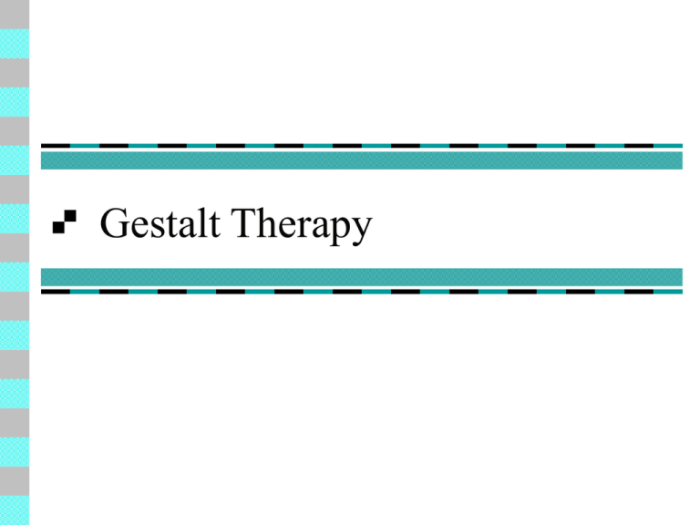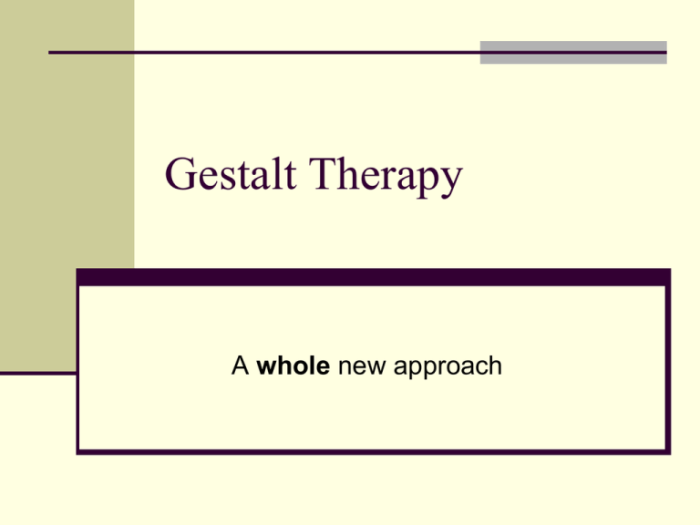Gestalt therapy making the rounds, a therapeutic approach gaining significant traction, offers a distinctive perspective on human experience and growth. Its holistic focus and emphasis on present-moment awareness have resonated with individuals seeking personal transformation.
This comprehensive overview delves into the core principles, techniques, and applications of Gestalt therapy, exploring its benefits and examining its impact on contemporary culture. By providing a thorough understanding of this influential approach, this article aims to shed light on its potential to empower individuals in their journey toward self-discovery and well-being.
Definition of Gestalt Therapy

Gestalt therapy is a humanistic psychotherapy approach that focuses on the individual’s present experience and the relationship between the individual and their environment.
The word “gestalt” is German for “form” or “whole,” and Gestalt therapy aims to help individuals become aware of their own unique patterns and ways of being in the world. Gestalt therapists believe that individuals are not simply the sum of their parts, but rather that they are complex and integrated beings who are constantly interacting with their environment.
Core Principles and Techniques of Gestalt Therapy
Gestalt therapy is based on several core principles, including:
- The present moment is the only reality.
- Individuals are responsible for their own choices and actions.
- Individuals are constantly interacting with their environment.
- Individuals have the potential for growth and change.
Gestalt therapists use a variety of techniques to help individuals become aware of their present experience and to promote growth and change. Some of these techniques include:
- The empty chair technique
- The hot seat technique
- Bodywork
- Dreamwork
Benefits of Gestalt Therapy: Gestalt Therapy Making The Rounds

Gestalt therapy has been shown to be effective in treating a variety of mental health issues, including:
- Anxiety
- Depression
- Relationship problems
- Trauma
Gestalt therapy can also help individuals to improve their self-awareness, communication skills, and problem-solving abilities.
Applications of Gestalt Therapy
Gestalt therapy can be used in a variety of settings, including:
- Individual therapy
- Group therapy
- Couples therapy
- Family therapy
Gestalt therapy can also be integrated with other therapeutic approaches, such as cognitive-behavioral therapy and psychodynamic therapy.
Current Trends in Gestalt Therapy
Gestalt therapy is a constantly evolving field, and there are a number of emerging trends in the field, including:
- The use of technology in Gestalt therapy
- The integration of Gestalt therapy with other therapeutic approaches
- The development of new Gestalt therapy techniques
These trends are helping to make Gestalt therapy more accessible and effective for a wider range of individuals.
Ethical Considerations in Gestalt Therapy
Gestalt therapists are bound by a code of ethics that includes the following principles:
- Gestalt therapists must respect the rights and dignity of their clients.
- Gestalt therapists must maintain confidentiality.
- Gestalt therapists must avoid dual relationships with their clients.
- Gestalt therapists must be competent in their practice.
Gestalt therapists who violate these ethical principles may be subject to disciplinary action.
Gestalt Therapy in Popular Culture

Gestalt therapy has been represented in a variety of popular culture media, including:
- Literature
- Film
- Television
These representations have helped to increase the awareness of Gestalt therapy and its benefits.
Research and Evidence Base for Gestalt Therapy

There is a growing body of research that supports the efficacy of Gestalt therapy. This research has shown that Gestalt therapy is effective in treating a variety of mental health issues, including anxiety, depression, and relationship problems.
However, more research is needed to further strengthen the evidence base for Gestalt therapy. This research should focus on the long-term effects of Gestalt therapy and on its effectiveness in treating different populations.
Gestalt Therapy Techniques
Gestalt therapists use a variety of techniques to help individuals become aware of their present experience and to promote growth and change. Some of these techniques include:
- The empty chair techniqueis used to help individuals explore their relationships with others.
- The hot seat techniqueis used to help individuals explore their own thoughts and feelings.
- Bodyworkis used to help individuals become aware of their physical sensations and to release tension.
- Dreamworkis used to help individuals explore their unconscious mind.
These techniques can be used in a variety of settings, including individual therapy, group therapy, and couples therapy.
FAQ Corner
What are the key principles of Gestalt therapy?
Gestalt therapy emphasizes the importance of present-moment awareness, personal responsibility, and the integration of mind, body, and emotions.
How is Gestalt therapy used in practice?
Gestalt therapists utilize various techniques, such as the empty chair, hot seat, and bodywork, to facilitate self-exploration and promote emotional release.
What are the potential benefits of Gestalt therapy?
Gestalt therapy can enhance self-awareness, improve communication skills, foster emotional regulation, and support personal growth and development.